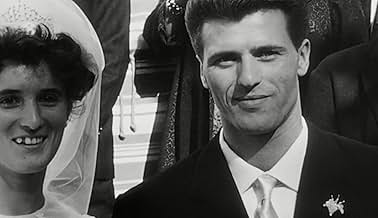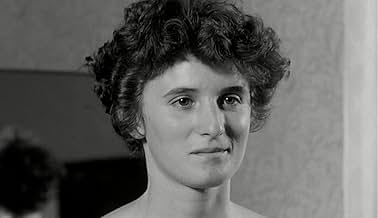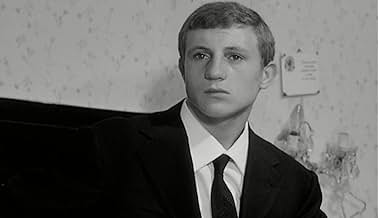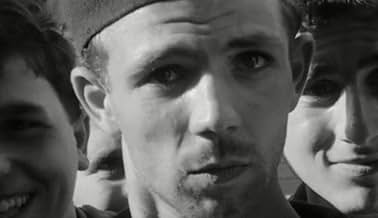CALIFICACIÓN DE IMDb
7.5/10
2.8 k
TU CALIFICACIÓN
Pier Paolo Pasolini entrevista a los italianos de 1963 sobre el sexo, el matrimonio y los roles de género.Pier Paolo Pasolini entrevista a los italianos de 1963 sobre el sexo, el matrimonio y los roles de género.Pier Paolo Pasolini entrevista a los italianos de 1963 sobre el sexo, el matrimonio y los roles de género.
Io Appolloni
- Self - Girl at Lido with Swimming Cap
- (sin créditos)
Graziella Chiarcossi
- Graziella the Bride
- (sin créditos)
Graziella Granata
- Self - Girl at Lido with Long Hair
- (sin créditos)
Pier Paolo Pasolini
- Self - Interviewer
- (sin créditos)
Opiniones destacadas
I too was disappointed, but not for the reasons cited in the previous comment.
Instead, I found the film very hard to follow, with lots of academic buzzwords (interviewer Pasolini refers to "the sex problem" at least 20 times), not all of it subtitled, and subtitles that faded out of legibility against light backgrounds.
The movie was visually unappetizing, in part because of inconsistent and often inept camera work, and in part because of a sloppy transfer to tape that washed out the middle tones and often made it hard to see and read people's faces.
The most annoying element was the recurrent muting of the voice tracks (and of course the accompanying sub-titles) that was labeled "self-censorship." Was this a comment on official censorship of the time? I get the impression that the most interesting answers were lost to the audience through this process.
An interesting and meaty idea from a provocative and often great filmmaker, undercut by directorial inexperience and poor repackaging.
Instead, I found the film very hard to follow, with lots of academic buzzwords (interviewer Pasolini refers to "the sex problem" at least 20 times), not all of it subtitled, and subtitles that faded out of legibility against light backgrounds.
The movie was visually unappetizing, in part because of inconsistent and often inept camera work, and in part because of a sloppy transfer to tape that washed out the middle tones and often made it hard to see and read people's faces.
The most annoying element was the recurrent muting of the voice tracks (and of course the accompanying sub-titles) that was labeled "self-censorship." Was this a comment on official censorship of the time? I get the impression that the most interesting answers were lost to the audience through this process.
An interesting and meaty idea from a provocative and often great filmmaker, undercut by directorial inexperience and poor repackaging.
At first sigh, social portrait. Pier Paolo Pasolini across Italy , talking with large categories of people about not very comfortable themes. Their answers, the crowd, the familiar names from Antonella Lualdi and Oriana Falacci to Alberto Moravia, Cesare Musatti or Giuseppe Ungaretti interventions and the answers, genuine, innocent, in few cases hypocritics of people and the discover of powerful tradition defining rules of life, the difference, real profound, betwen South and North of Italy, the silence of middle class , the laws and the essence of a special world. Sure, in my case, the name of director/ interwiever was the basic/ fundamental kick for not ignore this documentary. The prize - the high honesty, the humor, smiles, reactions, laugh, shame, reactions, the manner to explore the one front of him by Pasolini, the crumbs of nostalgia, the memories about pasolinian textes. So, a large slice of life, provocative, in same measure, yesterday and today and, in my case, just fascinating.
Amid some unsurprising considerations from major italian popular figures of the time, Pasolini publicly asks questions related to sex, ethics, sociology and politics to those bold and naive enough to attempt an answer.
The value of such an endevour - wether it is hundreds or hundreds of thounsands of interviews - is (admittedly by the author) debatable at best except for some - nowadays obvious - sociological observations.
Fortunately Pasolini closes (and saves) the film with a greatly poetic final 3 minutes section that feels like a wrap up of the "results" of his inquiry:
"Do men care about anything but living life? A couple getting married. They don't know anything about their love. Life is merciless the most when it is happy and innocent. The knowledge of what's good or evil lies ahead of this forgetfulness of those busy living. And those knowing don't talk in front of such a grace unwilling to learn. But this silence is criminal."
IMHO the movie is in this aphorism. While never boring the interviews are not really interesting (let alone sociologically relevant) either. The documentary was released rated for 18yo: a side note that again summarizes the point we can make today out of it.
Fortunately Pasolini closes (and saves) the film with a greatly poetic final 3 minutes section that feels like a wrap up of the "results" of his inquiry:
"Do men care about anything but living life? A couple getting married. They don't know anything about their love. Life is merciless the most when it is happy and innocent. The knowledge of what's good or evil lies ahead of this forgetfulness of those busy living. And those knowing don't talk in front of such a grace unwilling to learn. But this silence is criminal."
IMHO the movie is in this aphorism. While never boring the interviews are not really interesting (let alone sociologically relevant) either. The documentary was released rated for 18yo: a side note that again summarizes the point we can make today out of it.
Pasolini filmed this documentary in 1963, looking for an account of sexual life in Italy at a turning point in history. He travels south and north, to towns and countryside, interviewing intellectuals, workers, farmers and kids. The result is a strikingly accurate portrait of diversities in the country, and of inhibitions and problems to talk about a "natural" thing. Between the notable people interviewed, Nobel prize poet Ungaretti, writers Moravia, Cederna, Fallaci, a whole professional football team, and more.
What stroke me more is the great journalistic pace of the documentary, the technique of intermixing different areas of the country, a very clever approach. A great work still "modern" nowadays.
Sadly amusing the part where Pasolini (an homosexual himself) asked common people an opinion about homosexuality receiving answers of total denigration.
What stroke me more is the great journalistic pace of the documentary, the technique of intermixing different areas of the country, a very clever approach. A great work still "modern" nowadays.
Sadly amusing the part where Pasolini (an homosexual himself) asked common people an opinion about homosexuality receiving answers of total denigration.
Comizi d'amore (1965)
*** (out of 4)
Pasolini travels around Italy throwing a mic into various ranges of people asking frank and honest questions about sexuality. Various topics ranging from homosexuality, prostitutes, divorce, sexual freedom and even asking kids where babies come from. The type of people range from college students to the rich and poor and to women who normally can't speak openly. I'm sure this film was more of a sensation when originally released but I think it holds up quite well today for several reasons. For one, it's interesting to look back over forty-years ago and see how young people at the times thought about sex but also how the older people back then looked back on the moral and religious rules of their youth. The film also holds up well today because things really haven't changed too much whenever you really break down the groups of people like Pasolini did. I'm not sure is there was a point to this documentary as it seems like the director simply wanted to know what the country felt on certain issues. There's a lot of humor to be found in the film but most of this comes from the answers the children give about where babies come from. The most interesting thing, knowing that the director was gay, is him asking people about homosexuality and the answers they give him. Most people reply with disgust and I kept wondering if the director would crack and say something but he never does. I think the film goes on a bit too long but it's an interesting look at sexuality on moral and religious aspects.
*** (out of 4)
Pasolini travels around Italy throwing a mic into various ranges of people asking frank and honest questions about sexuality. Various topics ranging from homosexuality, prostitutes, divorce, sexual freedom and even asking kids where babies come from. The type of people range from college students to the rich and poor and to women who normally can't speak openly. I'm sure this film was more of a sensation when originally released but I think it holds up quite well today for several reasons. For one, it's interesting to look back over forty-years ago and see how young people at the times thought about sex but also how the older people back then looked back on the moral and religious rules of their youth. The film also holds up well today because things really haven't changed too much whenever you really break down the groups of people like Pasolini did. I'm not sure is there was a point to this documentary as it seems like the director simply wanted to know what the country felt on certain issues. There's a lot of humor to be found in the film but most of this comes from the answers the children give about where babies come from. The most interesting thing, knowing that the director was gay, is him asking people about homosexuality and the answers they give him. Most people reply with disgust and I kept wondering if the director would crack and say something but he never does. I think the film goes on a bit too long but it's an interesting look at sexuality on moral and religious aspects.
¿Sabías que…?
- ConexionesEdited into Lo schermo a tre punte (1995)
Selecciones populares
Inicia sesión para calificar y agrega a la lista de videos para obtener recomendaciones personalizadas
- How long is Love Meetings?Con tecnología de Alexa
Detalles
Taquilla
- Total a nivel mundial
- USD 2,789
- Tiempo de ejecución
- 1h 32min(92 min)
- Color
- Mezcla de sonido
- Relación de aspecto
- 1.85 : 1
Contribuir a esta página
Sugiere una edición o agrega el contenido que falta

















